Are you considering starting your own pest control business? Whether you have a knack for dealing with pesky critters or simply want to offer your expertise in keeping homes and businesses free from pests, obtaining a pest control license is an essential first step. In this article, we will walk you through the necessary steps to kickstart your pest control business, from understanding the licensing requirements to obtaining the appropriate certifications. Get ready to turn your passion for pest control into a successful and fulfilling venture!
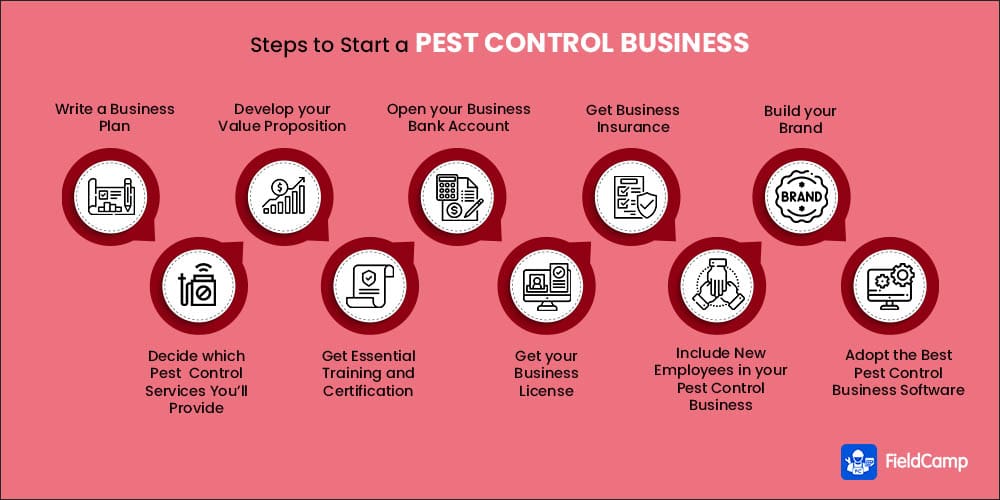
1. Understand the Importance of Pest Control Licensing
1.1 Why Pest Control Licensing is Necessary
Pest control licensing is of utmost importance in the industry for several reasons. Firstly, it ensures that individuals or businesses providing pest control services have received the necessary training and education to handle the job efficiently and effectively. This licensing requirement helps to maintain a certain level of professionalism and expertise in the field.
Moreover, pest control licensing is necessary to protect the safety and well-being of both the service providers and the clients. Dealing with pests often involves using chemicals and potentially hazardous substances. Licensed professionals have the knowledge and expertise to handle these substances safely, minimizing any risks to themselves, the environment, and the public.
1.2 Benefits of Obtaining Pest Control License
Obtaining a pest control license comes with several benefits. Firstly, it enhances your credibility and reputation as a professional in the industry. Clients are more likely to trust and hire a licensed pest control operator because it assures them of your expertise and adherence to industry standards.
Additionally, having a pest control license gives you a competitive edge over unlicensed individuals or businesses. Many customers prefer to hire licensed professionals as they provide a sense of security and assurance.
Lastly, obtaining a pest control license opens up opportunities for growth and expansion. With a license, you can offer a wider range of services, attract larger contracts, and potentially expand your business into different geographical areas.
1.3 Consequences of Operating Without License
Operating a pest control business without the necessary license can have severe consequences. Firstly, it is illegal and can result in fines, penalties, and even criminal charges. Additionally, without a license, you may not be eligible for insurance coverage, making you personally liable for any damages, injuries, or accidents that occur during the course of your work.
Moreover, operating without a license can damage your professional reputation and credibility. Word spreads quickly in the industry, and clients may be hesitant to hire an unlicensed operator in the future. This can significantly impact your ability to attract and retain customers.
Lastly, operating without a license may limit your business’s growth potential. Many government contracts, commercial clients, and even residential customers specifically require licensed pest control professionals. By not having a license, you exclude yourself from these potential opportunities.
2. Research the Licensing Requirements
2.1 Contact Local Regulatory Agencies
To start the process of obtaining your pest control license, it is crucial to reach out to the local regulatory agencies in your area. These agencies will have information about the specific licensing requirements and procedures that you need to follow.
They can provide you with the necessary forms, guide you through the application process, and answer any questions you may have regarding the licensing process. It is essential to consult with these agencies to ensure that you have all the relevant information before proceeding further.
2.2 Understand State and Federal Requirements
In addition to local regulations, it is essential to familiarize yourself with state and federal requirements for pest control licensing. Each state may have its own specific criteria and regulations that need to be met. Researching and understanding these requirements is crucial to ensure compliance and avoid any legal issues.
Federal regulations, such as those set by the Environmental Protection Agency (EPA), may also apply to certain aspects of pest control. For example, if you plan to use pesticides, you may need to obtain additional certifications or licenses from the EPA. Understanding and adhering to these requirements is vital to operate legally and safely.
2.3 Identify Specific Licensing Criteria for Pest Control
Once you have a clear understanding of the local, state, and federal requirements, it is important to identify the specific licensing criteria for pest control in your area. This may include educational qualifications, training programs, practical experience, and passing any required examinations.
By thoroughly researching and understanding the criteria, you can assess your current qualifications and identify any gaps that need to be filled. This will help you plan your training and education accordingly, ensuring that you meet all the requirements for obtaining a pest control license.
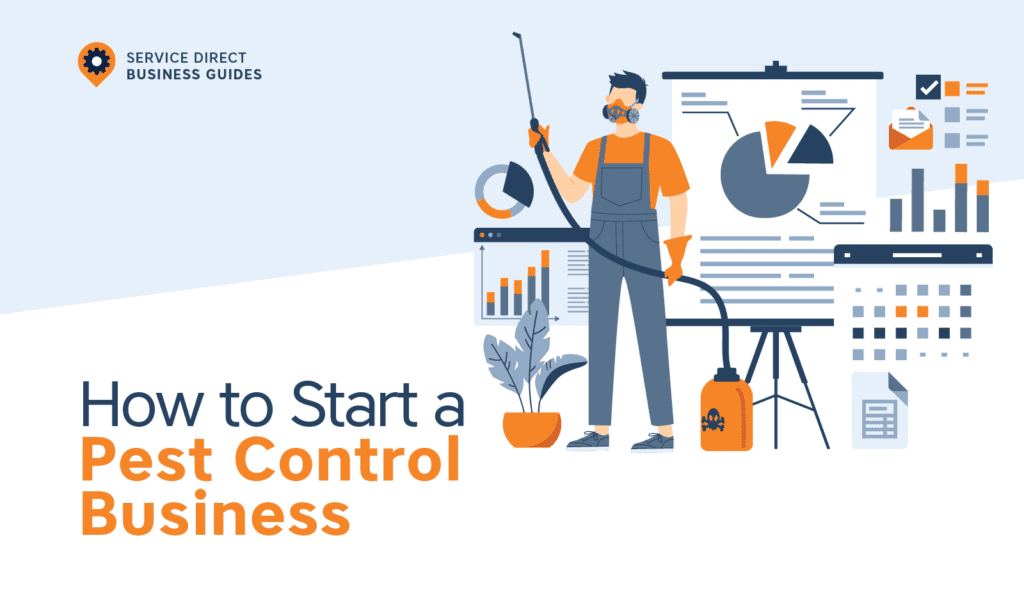
3. Complete the Necessary Training and Education
3.1 Pest Control Courses and Certifications
To meet the licensing requirements, you may need to complete specific pest control courses and certifications. These courses provide essential knowledge and skills in pest identification, biology, behavior, control methods, and the safe handling of chemicals.
There are various organizations and institutions that offer pest control courses and certifications. Research and choose reputable programs that are recognized by the industry. The courses may range from basic introductory courses to more advanced programs that focus on specialized areas of pest control.
3.2 Continuing Education for Pest Control Professionals
Pest control is a constantly evolving field, with new techniques, products, and regulations emerging regularly. As a licensed professional, it is important to stay up-to-date with the latest industry trends and advancements. Continuing education programs offer opportunities to enhance your knowledge and skills, ensuring that you remain competent in your field.
Consider participating in seminars, workshops, webinars, and industry conferences to expand your understanding and stay ahead of the curve. Additionally, joining professional associations and networks can provide access to valuable resources, updates, and support from fellow professionals.
3.3 Specialized Training Programs
Depending on your area of specialization within the pest control industry, you may require additional specialized training programs. For example, if you plan to handle wildlife management or fumigation services, there may be specific training courses or certifications that you need to complete.
Identify the specific areas of specialization you wish to pursue and research the training programs available. These specialized training programs will provide you with the necessary knowledge and skills to handle unique pest control situations effectively.
4. Prepare the Required Documents
4.1 Application Forms and Fees
To obtain a pest control license, you will need to submit an application form along with any required fees. These application forms can usually be obtained from the local regulatory agencies or downloaded from their websites. Fill out the forms accurately, providing all the necessary information and documentation requested.
Ensure that you also include the required fees with your application. The licensing fees may vary depending on your location, so make sure to verify the correct amount and acceptable payment methods.
4.2 Proof of Insurance
Insurance coverage is an essential requirement for pest control operators. Before you can obtain a license, you will need to provide proof of insurance coverage. This protects you, your business, and your clients from any potential liability or damages that may occur during the course of your work.
Contact insurance providers specializing in pest control to obtain the necessary coverage. Common types of insurance for pest control businesses include general liability insurance, professional liability insurance, and workers’ compensation insurance.
4.3 Business Entity Documents
If you plan to operate your pest control business as a separate legal entity, such as a corporation or limited liability company (LLC), you will need to provide the relevant business entity documents. These may include articles of incorporation, a certificate of organization, or partnership agreements.
Consult with a legal professional or business advisor to ensure that you fulfill all the legal requirements for your chosen business structure. These documents will need to be submitted as part of your licensing application.
4.4 Criminal Background Check
Many jurisdictions require individuals applying for a pest control license to undergo a criminal background check. This is to ensure that the person applying does not have any criminal convictions that could potentially impact their ability to operate in the industry.
Contact your local authorities to determine the process and requirements for the criminal background check. Be prepared to provide any necessary documentation or fingerprints as part of the process.
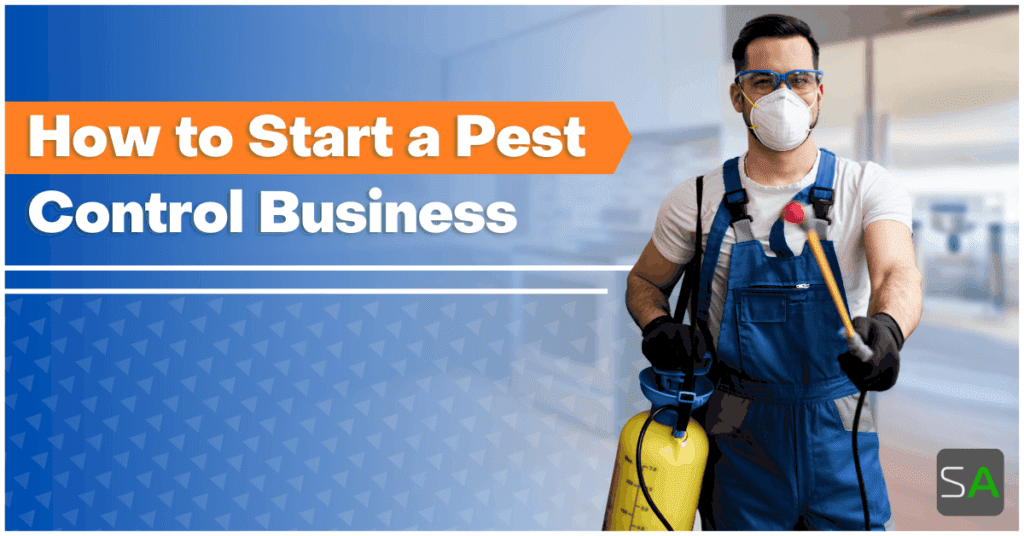
5. Obtain Liability Insurance
5.1 Importance of Liability Insurance
Liability insurance is an essential component of running a pest control business. It provides financial protection against claims or lawsuits arising from damages, injuries, or accidents that occur during your pest control operations. Without liability insurance, you would be personally responsible for any legal costs or compensation payments, which could have a significant impact on your financial stability.
5.2 Types of Insurance Coverage
There are several types of insurance coverage that you may need to consider for your pest control business. General liability insurance provides coverage for bodily injury, property damage, and personal injury claims. This protects you against claims from third parties, such as clients or members of the public.
Professional liability insurance, also known as errors and omissions insurance, covers claims arising from professional negligence or mistakes in your pest control services. This can provide coverage for financial losses incurred by clients due to errors or omissions on your part.
Workers’ compensation insurance is essential if you have employees working for your business. It provides coverage for medical expenses, lost wages, and rehabilitation costs in the event that one of your employees is injured or becomes ill while on the job.
5.3 Research and Compare Insurance Providers
To obtain the best insurance coverage for your pest control business, it is important to research and compare insurance providers. Look for insurers who specialize in providing coverage for pest control businesses and have a good reputation within the industry.
Consider factors such as coverage limits, deductibles, premiums, and any additional benefits or endorsements offered by the insurer. It may be beneficial to seek recommendations from fellow pest control operators or consult with an insurance broker who can guide you through the selection process.
5.4 Obtain Insurance Certificate
Once you have chosen an insurance provider and obtained the necessary coverage, request an insurance certificate or proof of insurance. This document will serve as evidence that you have the required liability insurance and can be provided to clients or regulatory agencies as part of the licensing process.
Keep the insurance certificate easily accessible and ensure it remains valid and up-to-date. Renew your insurance coverage as required and notify your insurance provider of any changes to your business operations or risk factors.
6. Purchase Pest Control Equipment and Supplies
6.1 Essential Equipment for Pest Control Business
As a licensed pest control professional, it is important to have the necessary equipment to effectively handle various pest control situations. Some essential equipment includes protective gear (such as gloves, goggles, and respirators), sprayers, bait stations, traps, inspection tools, and application equipment.
Research reputable suppliers and consider the quality, durability, and effectiveness of the equipment when making purchasing decisions. Invest in reliable and industry-approved equipment to ensure the safety and efficiency of your pest control operations.
6.2 Quality Pest Control Products and Chemicals
In addition to equipment, it is crucial to have access to high-quality pest control products and chemicals. Consult with suppliers or industry experts to determine the most effective products for different types of pests and control methods.
When working with chemicals, ensure that you comply with all safety regulations and guidelines. Store and handle chemicals properly to minimize any risks to yourself, your employees, and the environment.
6.3 Equipment Maintenance and Safety
Regular maintenance and safety checks are essential for the longevity and effectiveness of your pest control equipment. Create a maintenance schedule and ensure that equipment is cleaned, calibrated, and serviced as needed. This will help prevent breakdowns, ensure accurate application, and prolong the life of the equipment.
Implement strict safety protocols for the handling and storage of equipment and chemicals. Train yourself and your employees on proper equipment usage, safety procedures, and emergency protocols. Following safety guidelines will minimize the risk of accidents or injuries during pest control operations.
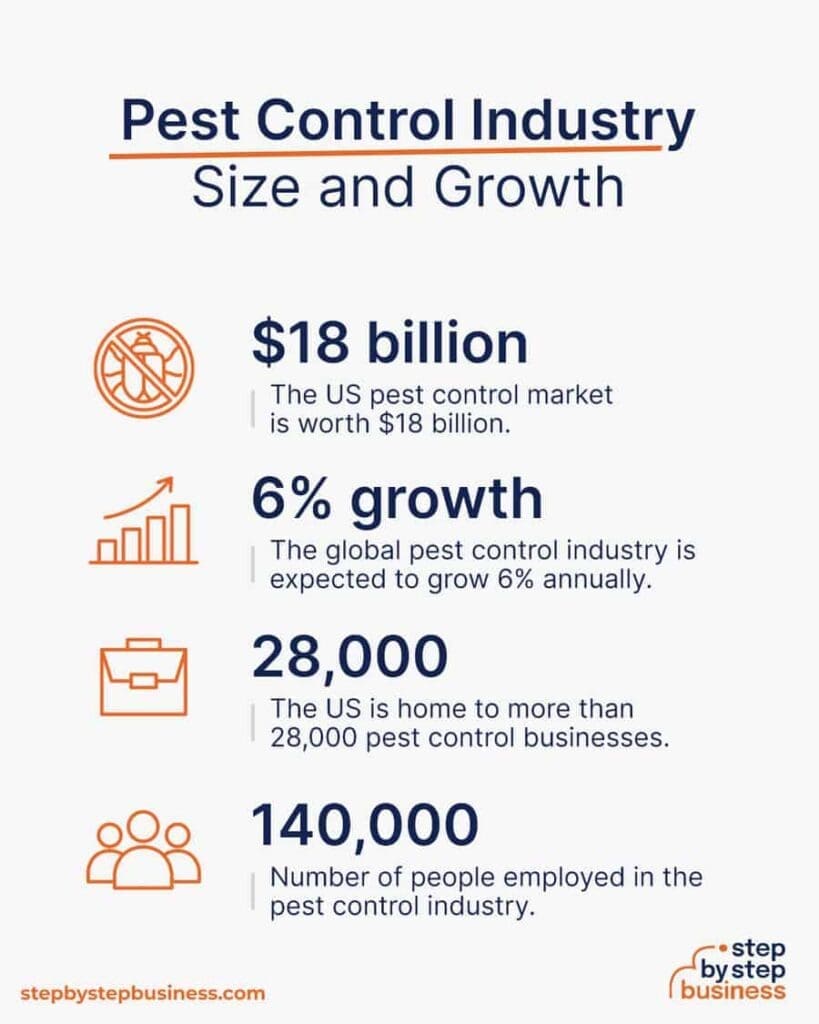
7. Establish a Business Structure
7.1 Sole Proprietorship
A sole proprietorship is the simplest and most common business structure for pest control operators. Operating as a sole proprietor means that you are the sole owner of the business, and there is no legal distinction between you and the business. This structure offers low startup costs and offers complete control over the business decisions.
However, keep in mind that as a sole proprietor, you have unlimited personal liability for any debts or liabilities incurred by the business. This means your personal assets could be at risk if the business faces financial or legal challenges.
7.2 Partnership
If you plan to start a pest control business with another individual, you may consider forming a partnership. A partnership allows for shared ownership, responsibility, and decision-making. It also allows for shared resources and risks.
When entering into a partnership, it is crucial to have a well-drafted partnership agreement outlining the rights and responsibilities of each partner. This agreement should address key issues such as profit sharing, decision-making authority, dispute resolution mechanisms, and the process for adding or removing partners.
7.3 Limited Liability Company (LLC)
A limited liability company (LLC) is a popular business structure for many pest control operators. It offers a combination of limited personal liability and the flexibility of a partnership or sole proprietorship.
With an LLC, your personal assets are generally protected from business liabilities, meaning that your personal finances are not at risk if the business faces legal or financial challenges. Additionally, an LLC offers flexibility in terms of management structure and tax options.
Forming an LLC involves filing the necessary paperwork with the appropriate state authority and paying the required fees. It is advisable to consult with a legal professional to ensure that you fulfill all the legal requirements and understand the implications of forming an LLC for your pest control business.
7.4 Corporation
Forming a corporation involves the creation of a separate legal entity that is distinct from its owners. A corporation offers limited personal liability, similar to an LLC, but may have stricter compliance requirements and additional administrative burdens.
Corporations may be more suitable for larger pest control businesses looking to attract investors or issue shares of stock. However, the formation process is more complex and typically requires legal assistance and compliance with state regulations.
Consult with a business attorney or accountant to determine whether forming a corporation is the right choice for your pest control business. They can guide you through the process, helping you understand the implications and compliance requirements associated with this business structure.
8. Register Your Business
8.1 Choose a Business Name
Choosing a business name is an important step in establishing your pest control business. Select a name that is catchy, memorable, and reflects the nature of your services. Ensure that the chosen name is not already in use by another pest control business in your area by conducting a thorough search.
Check with your local business registration authorities to determine any specific requirements or restrictions for naming your business. They may have guidelines regarding the use of certain terms or the need for a fictitious name registration if you plan to operate under a name different from your legal name.
8.2 Register with Relevant Authorities
To establish your pest control business, you will need to register it with the appropriate authorities. This typically involves filing the necessary registration forms with your local government or state agency responsible for business registrations.
The registration process may include providing details about your business, such as its legal structure, ownership information, and contact details. This information will be used to create a record of your business and ensure compliance with local regulations.
8.3 Obtain Employer Identification Number (EIN)
An Employer Identification Number (EIN) is a unique nine-digit number issued by the Internal Revenue Service (IRS) to identify your business for tax purposes. In most cases, obtaining an EIN is necessary if you plan to hire employees or form a business entity such as an LLC or corporation.
Apply for an EIN online through the IRS website. The process is relatively straightforward and requires basic information about your business. Once you have an EIN, you can use it for various tax-related purposes, such as filing tax returns and opening a business bank account.
8.4 Obtain Necessary Permits and Licenses
In addition to the pest control license, other permits and licenses may be required depending on your location and the nature of your business. These may include business permits, tax registration certificates, health department permits, or permits for the storage and handling of certain chemicals.
Research the specific requirements for your area and industry. Contact the relevant local authorities to determine which permits and licenses you need to obtain and the process for applying for them. Ensure that you comply with all applicable regulations to avoid any legal issues or penalties.
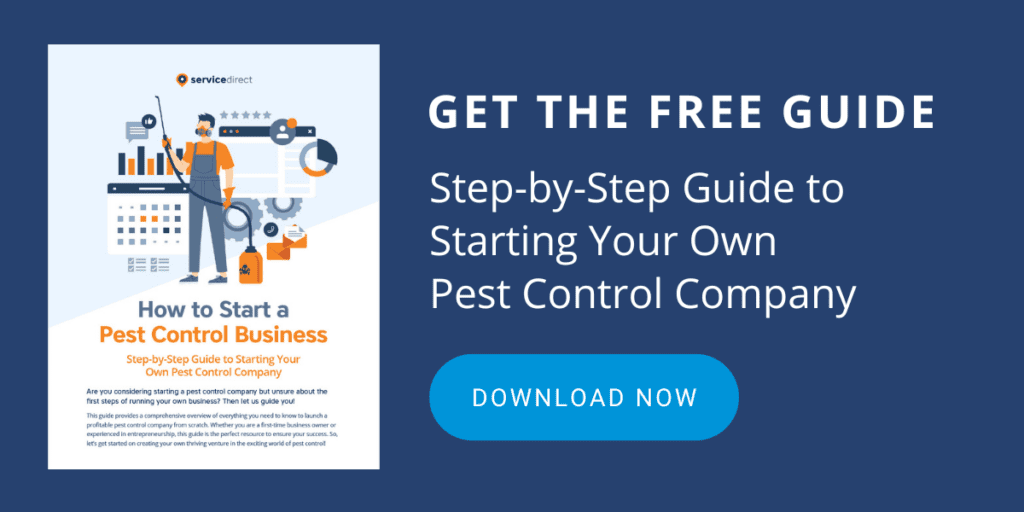
9. Develop a Marketing Strategy
9.1 Identify Target Market
To effectively market your pest control business, it is important to identify your target market. Consider the demographics, geographic location, and specific needs of your potential customers. This will help you tailor your marketing efforts to reach and attract your target audience.
For example, if you specialize in residential pest control, your target market may be homeowners or renters in a specific area. If you focus on commercial pest control, your target market may include property managers, business owners, or facility managers.
9.2 Establish an Online Presence
In today’s digital age, having a strong online presence is crucial for any business. Create a professional website that showcases your services, expertise, and contact information. Optimize your website for search engines to improve your visibility in online searches.
Utilize search engine optimization techniques to improve your website’s ranking in search results. This can include incorporating relevant keywords, creating quality content, and building backlinks from reputable websites.
9.3 Utilize Social Media Platforms
Social media platforms offer a cost-effective way to promote your pest control business and engage with potential customers. Identify the platforms most relevant to your target audience and establish a presence on those platforms.
Regularly post informative and engaging content related to pest control tips, prevention methods, and industry updates. Encourage followers to engage with your content through likes, shares, and comments. This will help increase your visibility and brand awareness.
9.4 Networking and Building Relationships
Building relationships within the local community can significantly benefit your pest control business. Attend industry events, join local business organizations, and participate in community activities. This will help you establish connections with potential referral sources, such as real estate agents, property managers, or local businesses.
Maintain regular communication with your existing clients and provide exceptional customer service. Satisfied customers are more likely to refer your services to others, helping you expand your customer base through word-of-mouth referrals.
9.5 Implement Effective Advertising Techniques
Advertising can play a crucial role in attracting new customers to your pest control business. Consider utilizing both online and offline advertising methods to reach your target audience.
Online advertising options include pay-per-click (PPC) advertising, social media advertising, and display ads on relevant websites. Offline advertising methods may include print advertisements in local newspapers or directories, radio ads, or even vehicle wraps.
Monitor the performance of your advertisements and adjust your strategies accordingly. Track leads and conversions to determine the effectiveness of each advertising method and focus your efforts on the strategies that deliver the best results.
10. Comply with Ongoing Regulations
10.1 Stay Up-to-Date with Pest Control Laws
Pest control laws and regulations may change over time, so it is important to stay informed and up-to-date. Regularly review any updates or changes to relevant local, state, and federal regulations that may affect your business operations.
Subscribe to industry newsletters, attend seminars or webinars, and participate in professional organizations to access the latest information and resources. Compliance with pest control laws is crucial to avoid any legal issues or penalties.
10.2 Maintain Licenses and Certifications
Once you obtain your pest control license, it is important to maintain its validity by renewing it as required. Set up reminders or calendar notifications to ensure that you submit your renewal applications on time.
Additionally, stay current with any continuing education requirements or certifications that need to be periodically renewed. This will demonstrate your commitment to ongoing professional development and ensure that your knowledge and skills remain up-to-date.
10.3 Follow Safety and Environmental Guidelines
Pest control operations involve the use of chemicals and potential risks to the environment. It is essential to strictly follow safety protocols and guidelines to protect yourself, your employees, and the environment.
Use personal protective equipment (PPE) when handling chemicals or performing pest control activities. Follow proper disposal procedures for chemicals and ensure that you comply with all environmental regulations regarding their storage and usage.
10.4 Regularly Train and Educate Staff
If you have employees working for your pest control business, it is crucial to provide them with ongoing training and education. This will ensure that they are knowledgeable about the latest techniques, regulations, and safety procedures.
Invest in regular training sessions conducted by industry experts or enroll your employees in relevant courses or certifications. By continually improving their skills and knowledge, you enhance the quality of service provided by your pest control business.
In conclusion, obtaining a pest control license and successfully starting a pest control business requires careful planning, research, and adherence to regulatory requirements. By understanding the importance of licensing, completing the necessary training and education, organizing the required documents, and establishing a solid business foundation, you can embark on a successful and legally compliant pest control journey. Continuously staying up-to-date with regulations, maintaining licenses and certifications, following safety guidelines, and implementing effective marketing strategies will contribute to the long-term success and sustainability of your pest control business.

I am Randy, the author behind PestControld.com. Drawing from decades of experience, I aim to provide valuable insights, expert advice, and practical recommendations to help you make informed decisions when assessing viable pest control solutions.